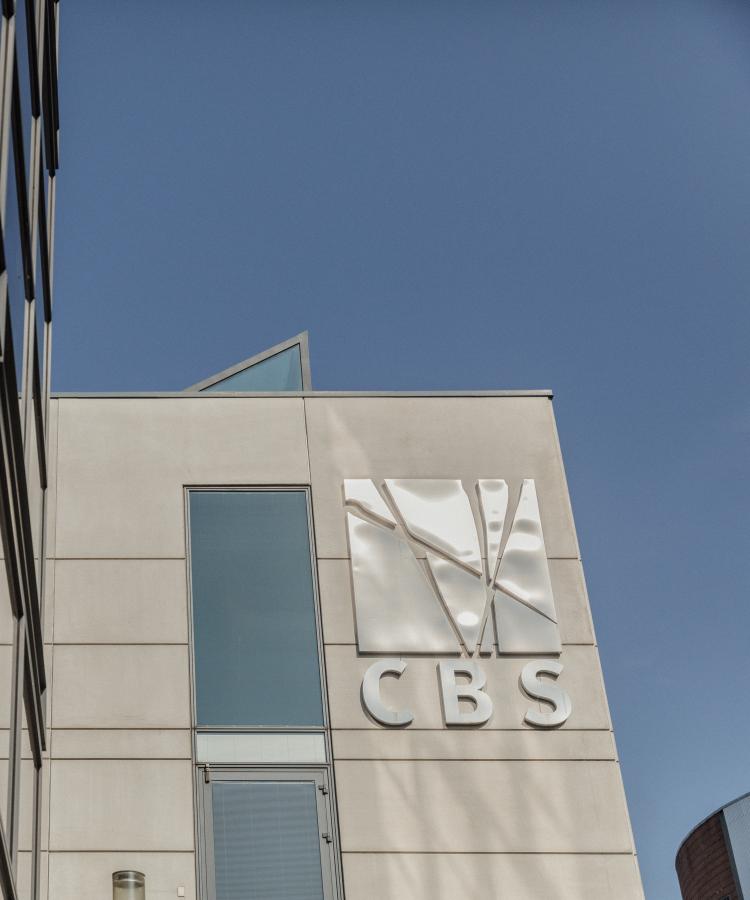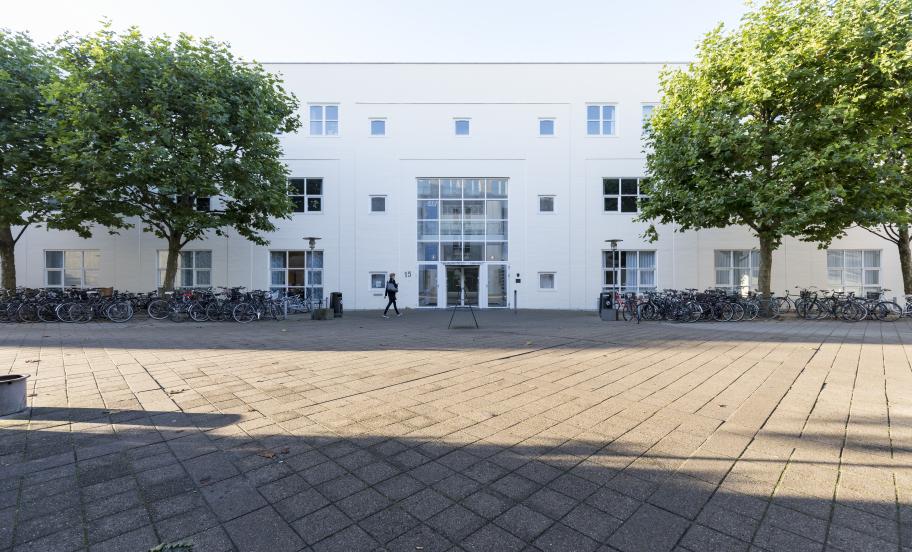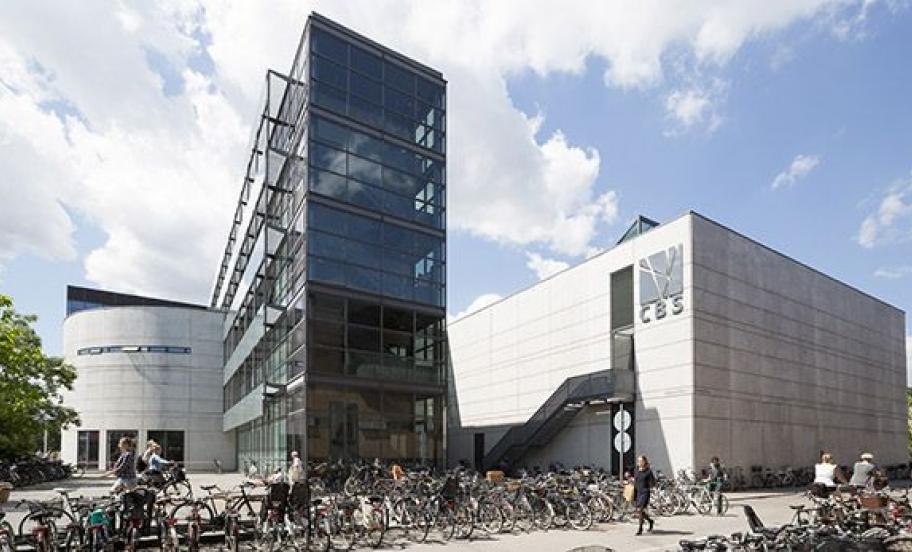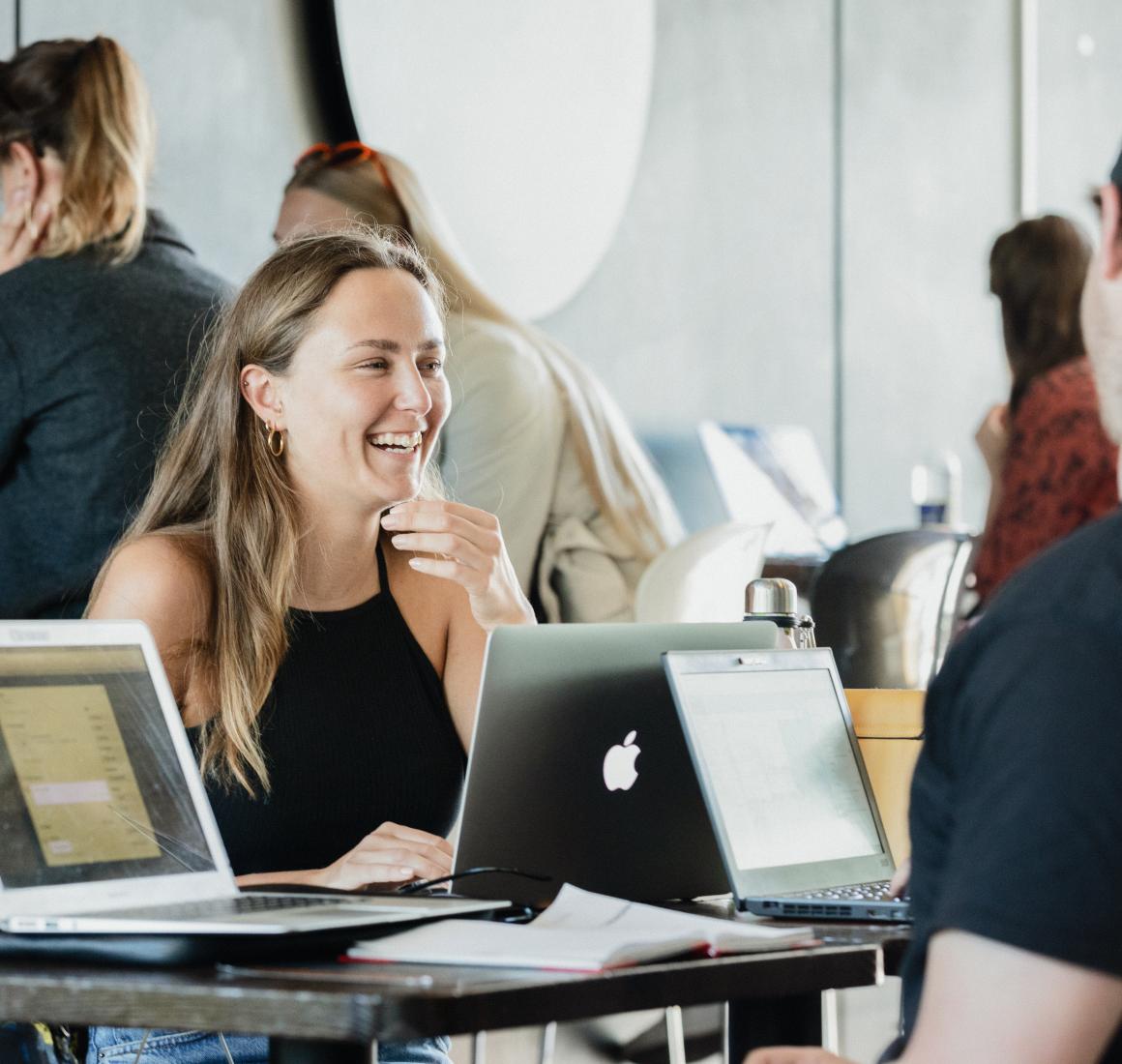MSc in Economics and Business Administration in Accounting, Strategy and Control
The MSc EBA ASC gives you the skills to measure, manage, and create value in organisations. You will learn to use management accounting, performance management, and corporate finance to turn data into strategic decisions that drive business performance.

About MSc in Economics and Business Administration in Accounting, Strategy and Control
Why study MSc EBA ASC?
3 good reasons to choose MSc EBA ASC
Finance and business performance
Curiosity about how value is created and managed
A balance of analytical thinking and understanding people
“ Even though some things look unmanageable in the beginning, you will get there and you will learn it eventually, so no worries. ” Elisabeth
Student, MSc EBA ASC

Accounting as the language of business
Accounting is often described as the language of business, and this programme focuses on mastering that language to enable value-creating decisions and behaviour within organisations. You will learn how to use both financial and non-financial information to understand a company’s performance and to support strategic choices that shape its future.
Management accounting for planning and decision-making
At the core of the programme is the ability to analyse and apply information for decision-making, financial planning, and performance analysis. You will learn to measure everything from product costs, customer profitability, and company value to employee satisfaction, carbon footprint, and other sustainability indicators.
By understanding the strengths and limitations of different measurement tools, you will gain deep insights into how value is created . Also, at what cost within an organisation.
“ One thing that was important to me when choosing ASC was that the programme offers a wide range of skills, which allows me to develop professionally.
” Simon
Student, MSc EBA ASC

Data analytics to measure performance
Performance management and incentives
Measuring and managing performance at both the individual and organisational level is essential for encouraging value-creating behaviour. You will learn to design and analyse performance and risk measurement systems that create transparency and identify challenges such as rising costs, declining product quality, or missed sustainability goals. With this knowledge, you will be able to develop incentive systems that motivate departments, teams, and individuals to align their efforts with the company’s strategic objectives.
Data analytics and strategic communication
Today’s finance professionals are not only expected to master quantitative analysis but also to work closely with business functions across the organisation. In this programme you will strengthen your data analytics skills for an increasingly digital finance environment. Also, you will develop your ability to communicate insights effectively. You will learn to be a financially informed business partner who supports strategic and operational decision-making with fact-based analysis.
Open day for master programmes 2026
Are you considering a master programme at CBS? Come visit us for Open Day and hear about your opportunities .
Read more
Master events
See upcoming events that can help you with your study choice and admission.
Structure
Finance
You learn to analyse financial performance and link economic measures to strategic objectives. Finance in Accounting, Strategy and Control focuses on how investment decisions, valuation, and performance metrics shape business strategy and organisational value creation.
Organisation and management
You learn how leadership, structure, and governance influence performance and decision-making. Organisation and management in Accounting, Strategy and Control focus on how management control systems support strategy and create alignment between goals and results.
Accounting and auditing
You learn how financial information is produced, analysed, and used to guide decisions. Accounting and auditing in Accounting, Strategy and Control focus on the role of accounting systems in ensuring transparency, control, and accountability across organisations.
3 things to consider
Interest in data-driven decision-making
Understanding numbers in context
Mix of theory and practice
Programme overview
1st semester
2nd semester
3rd semester
4th semester
More about the programme
Close link to real life finance functions
It’s possible for you to combine your studies with a student job. This further adds a practical perspective that fuels productive discussions in and outside the classroom. Another practical facet of your learning journey is achieved through your active interaction with the programme’s corporate partners. These include the representatives from the finance functions of some of the largest global Danish corporations and top-tier consulting firms. This engagement will provide you with invaluable practical insights and a unique perspective on the business community.
Options during the programme
Electives
On the 3rd semester, you can choose to study courses of your specific interest. CBS offers a large number of electives within a wide range of topics. You can also choose to take electives at other Danish universities. The electives you choose have to be relevant for your programme.
See the current selection of CBS electives on Courses at master level.
Minor
On the 3rd semester, you can also choose to study a so-called minor. A minor is a package of electives within a specific academic area. Typically, it consists of 3 courses. By taking a minor, you strengthen your competences within a specific area of interest, and you can use it to qualify for specific jobs or industries.
See the current selection of CBS minors on Minors.
Exchange
Many students choose to go on exchange on their 3rd semester; usually at one of CBS’ more than 300 partner universities. When you go on exchange through CBS, you do not have to pay for the teaching at the foreign university (with a few exceptions), and you can bring your SU (student grant).
Find a list of all CBS partner universities here.
Internship
You can choose to replace some of your electives with a so-called academic internship. The academic internship consists of an internship period at a company, which is then completed with a project report. You can do the internship at a company in Denmark or abroad.
When doing an internship you get the opportunity to relate theory to practice and reflect on the academic training you receive at CBS in a practical setting. Therefore, the project report and work assignments during your internship have to be relevant to your study programme.
CEMS
On ASC you can apply for the CEMS - Master in International Management programme. CEMS MIM is a double degree programme, which gives you the opportunity to add a second degree in international management to your CBS degree. This means that you will get both the MSc degree and the CEMS in International Management degree.
CEMS is a 1-year programme, which you study in combination with your CBS degree in your 3rd and 4th semester. Part of it takes place at one of the other CEMS universities abroad.
Learn more about CEMS / Master in International Management.
Master's thesis
Your 2nd year is completed with a master's thesis. You choose the topic you want to write about which allows you to focus on a specific topic of your interest. Typically, you write your master's thesis with a fellow student.
“ The most valuable aspect of ASC's academic curriculum is its emphasis on applied learning. I rarely feel that what I'm being taught only applies to an academic career. ” Simon
Student, MSC EBA ASC

Open day for master programmes 2026
Are you considering a master programme at CBS? Come visit us for Open Day and hear about your opportunities .
Read more
Study environment
International environment and teamwork
You will have a good opportunity to socialise with fellow students who share your interests in management accounting and the CFO domain.
The study environment at the programme is highly international with a significant proportion of foreign students. This creates an open-minded and cooperative atmosphere. And also, students are strongly encouraged to work in teams to improve their social skills and exploit the learning synergies that multi-cultural teamwork tends to bring.
Student life at CBS
Studying at CBS is much more than just preparing for and going to classes.
At CBS, there are more than 20,000 students with different backgrounds and nationalities. Teamwork is an essential part of studying at CBS both in classes and in extracurricular activities.
With more than 100 student organisations, you also have plenty of opportunities to engage and connect with students across programmes and classes.
Learn more about the vibrant student life at CBS, the student organisations, and the international environment on Student life.
For internationals
If you are an international student, we have gathered a lot of information about what it is like to be an international student at CBS and how you can prepare for life in Denmark.
Read more on International students.
Meet the students
For internationals
Are you interested in studying at CBS as a full degree or exchange student? Or participating in CBS Summer University? Are you a freemover or do you want to study a single course? Here you can find information regarding how to apply, how to prepare for life in Denmark and what studying at CBS is like. Welcome!

Teaching and exams
Teaching
Classes are conducted as lectures and in some cases combined with exercises. As in all lectures, student interaction is important, and the quality often depends on the attitude of the students and their willingness to participate. For this reason, the teacher often uses cases, hand-in essays or have presentations by smaller groups of students.
There is a certain degree of progression between first and second semester courses. In the first semester you are introduced to core concepts and methods within management accounting and financial analysis. The core concepts and methods form the foundation on which discussions in the second semester will take place.
Read more about Teaching and working methods.
Exams
The programme includes both written and oral exams. Oral exams are used often because the focus is on learning theories and models as well as on being able to explain, discuss and reflect on how and why they work. Many students underestimate how much time it takes to truly understand the material well enough to talk about it confidently, so give yourself time to get there.
In the second semester, you will also work on a larger group project where you dive deeper into a topic and explore a specific problem together with your team.
Read more about Exams.
Student life at CBS
Being a CBS student is about more than going to lectures and doing exams.
Get a glimpse of student life at CBS. Here, you can explore what a typical day of teaching and exams looks like.
Also, you can learn how our programmes are structured and read about social life on campus, including the many ways to connect with fellow students.

Time consumption
Workload
You should know that it is demanding to study in a graduate programme, and both the curriculum and workload is significantly higher than at bachelor level.
If you are studying on a full-time graduate programme, you should expect spending approximately 37 hours on average on your studies each week. The workload will vary during the year.
Hectic around exams
The time leading up to assignment submissions and exams can be hectic, and you can easily work more than 40 hours a week in this period. Preparing for oral exams can be especially time consuming, because you have to be able to explain and discuss the covered concepts and theories and learn things by heart.
Read more on Teaching and working methods
Student job
Most programmes are quite flexible in terms of combining studies with a student job. Most students work a maximum of 15 hours a week in order to have sufficient time for their studies.
Studying in Denmark - for internationals
If this is your first time studying in Denmark, you may find teaching and exam formats, the grading scale and the academic calendar very different from what you are used to.
Read about everything you need to know as an international student studying at CBS on International students
In need of special support?
Do you have a disability such as dyslexia, anxiety, autism, ADHD, long-term effects of concussion or another physical, psychological or neurological disability?
Then you have the opportunity to apply for Special Educational Support (SPS) and special conditions while studying.
This ensures you can study on equal terms with your fellow students.

Entry requirements
Entry requirements
You are qualified for admission to the study programme if you fulfil the following requirements.
Please note that fulfilling the requirements does not guarantee you a study place.
1. Bachelor degree
2. Language requirement
3. Academic requirements
1. Bachelor degree
You must hold a bachelor degree to fulfil the general requirement for admission to CBS’ master programmes. You must have completed your bachelor degree before study start.
Legal claim
No applicants have a legal right of admission to this programme as it is not the natural progression for any bachelor degree.
Have you not yet completed your bachelor degree?
You can apply for admission even if you have not yet completed your bachelor’s degree. However, you must finish it before study start. If you are offered a place, you will be conditionally admitted, which means:
- You must complete your bachelor’s degree before you can begin your studies at CBS.
- You must upload your bachelor diploma and transcript no later than 31 August.
2. Language requirement
English level A (Panel content)
The language requirement
The language requirement is English at Danish level A.
Documentation deadline
You must fulfil and document the language requirement before the application deadline.
Check if you fulfil the language requirement
Use the tabs above to find out how you can document English level A. Each tab shows an approved way to fulfil the requirement, depending on your background.
We do not accept any documents other than those listed in the tabs.
The following cannot be used as alternatives:
- a letter from your university
- a letter from a professor
- a combination of several incomplete qualifications from the lists above
- Bachelor degrees or courses regardless of origin and level
Danish upper secondary exam (Panel content)
Required courses and levels
Danish upper secondary exam
If you have passed English level A from an upper secondary school in Denmark (ie. stx, hhx, htx, hf) you fulfil this requirement.
English level A must be passed with a minimum grade point average of 2.0.
Supplementary upper secondary courses
English A as a single subject via secondary school supplementation (Gymnasialt suppleringskursus (GSK)) or as a Higher Preparation Examination single subject (HF-enkeltfag).
English level A must be passed with a minimum grade point average of 2.0.
Individual competency assessment (IKV)
If you think you have language competences corresponding to an English level A, you have the possibility to request an assessment - Individuel Kompetencevurdering (IKV) from a Danish VUC (adult education centre).
Required documentation
Upper secondary (ie. stx, hhx, htx, hf) certificate:
- a scan/photo of the original, stamped and signed hard copy or
- a digitally signed certificate downloaded from Min Kompetencemappe
Individual competency assessment (IKV):
- Official IKV assessment
Other upper secondary exams (Panel content)
Find your country
Austria
Required courses and levels
Minimum total sum of 11 weekly lessons over years 10, 11 and 12 and Erste lebende Fremdsprache and Wahlpflichtgegenstände in English language. Subjects that are taught in English even as Wahlpflichtgegenstände do not count.
Required documentation
Reifeprüfung diploma certificate including Stundentafel covering (min.) 4 years of the Oberstufe OR
Reife- und Diplomprüfung diploma certificate including Stundentafel covering (min.) 5 years of the Oberstufe.
International Baccalaureate (IB)
Required courses and levels
- English A1, higher level
- English A2, higher level
- English B, higher level
- English A1, standard level
- English A2, standard level
- English A Language and Literature, higher level
- English A Language and Literature, standard level
- English A Literature, higher level
- English A Literature, standard level
Required documentation
Official IB diploma and/or transcript. Alternatively, you can give CBS access to your results via IBO.org.
European Baccalaureate (EB)
Required courses and levels
• L I
• L II
• L III – 6 years (documentation for 6 years must be included)
Required documentation
Official EB diploma and/or transcript
Australia
Required courses and levels
A complete upper secondary education from Australia, where the majority of the education has been taught in English, fulfils the English A language requirement.
Required documentation
Senior Secondary Certificate of Education (SSCE) as well as Statement of Result or Record of Achievement or Qualifications Certificate, covering subjects and grades during the last two years of the secondary education.
Bulgaria
Required courses and levels
English as first foreign language (556 number of classes) AND English Intense Study (648 number of classes)
Required documentation
- Diploma za (Zavarsheno) Sredno Obrazovanie / za Sredno Obrazovanie and
- Grade transcript for Years 10, 11 and 12
Canada
Required courses and levels
A complete upper secondary education from Canada, where the majority of the education has been taught in English, fulfils the English A language requirement.
Required documentation
High School Diploma / Graduation Diploma (or equivalent for your province) as well as Transcript of grades / High School Results (or equivalent for your province)
England, Wales, Northern Ireland
Required courses and levels
- A complete upper secondary education taught in England, Wales or Northern Ireland or
- A level English Language or
- A level English Literature
Required documentation
- GCSE certificate(s) (with a min. of 6 subjects) as well as A-level (Advanced level) certificate(s) (with a min. of 3 subjects) both taken in the UK or
- Official A level certificate for either English Language or English Literature
Germany
Required qualifications
English passed (5 points or higher) as a higher level course (either erhöhtes Anforderungsniveau or Leistungskurs) in both the Qualifikationsphase (half-year results) and the Abiturprüfung (Prüfungsfach) as part of the Abitur.
Courses marked erhöhtes Anforderungsniveau or Leistungskurs may be designated in a number of different ways such as:
- L or LK or Leistungskurs
- P or Profilfach
- K or Kernfach*
- eA or erhöhtes Anforderungsniveau
- E and designated as erhöhtes Anforderungsniveau in the certificate legend
- HF or Hauptfach
- PF or Profilfach
- Highlighted in grey and and designated as Leistungsfächer in the certificate legend
*If you have had English as a Kernfach your Abiturzeugnis needs to state that this means you have had English at either erhöhtes Anforderungsniveau or as Leistungskurs.
For applicants with a Waldorfschule/Rudolf Steiner Schule Abitur or Deutsche Internationale Abitur/prüfung (DIA/DIAP) please contact graduateadmission@cbs.dk for more information.
Required documentation
All pages of your Zeugnis der Allgemeinen Hochschulreife (Abiturzeugnis): cover, diploma and report card for all 4 half-years showing the Qualifikationsphase as well as the Abiturprüfung
Iceland
Required qualifications
For upper secondary studies completed according to the 2008 reform:
Minimum 25 Fein (new credits) obtained in English; of these, minimum 15 Fein must be at Þrep (qualification level) 3 or higher
For upper secondary studies completed according to the 1999 reform:
- Minimum 18 einingar (old credits) obtained in English; minimum one English subject must be at level 6 or higher (e.g. ENS 603)
Required documentation
Official transcript (in Icelandic) for Stúdentspróf
NB: Letters issued by the institution that do not list the names, module codes, grades and codes/points for all the passed courses are not accepted.
Ireland
Required qualifications
A complete upper secondary education from Ireland, where the majority of the education has been taught in English, fulfils the English A language requirement.
Required documentation
The Established Leaving Certificate Examination (Leaving Cert) with a min. of 6 subjects total
Malta
Required qualifications
A level
Required documentation
Matriculation Certificate and Advanced Level Certificate og Intermediate Level Certificate
New Zealand
Required qualifications
A complete upper secondary education from New Zealand, where the majority of the education has been taught in English, fulfils the English A language requirement.
Required documentation
National Certificate of Education Achievement (NCEA) levels 1 and 2 and 3
Norway
Required qualifications
The following combinations from the Norwegian upper secondary education courses must be passed:
VG3 SPR3010 & SPR3011
or
VG3 SPR3012 & SPR3013
or
VG SPR3031 & SPR3032
Required documentation
Official transcript for the Vitnemål for videregående opplæring
Scotland
Required qualifications
A complete upper secondary education from Scotland, where the majority of the education has been taught in English, fulfils the English A language requirement.
Required documentation
Scottish Qualification Certificate as well as Summary of Attainment, Detail Record of Attainment and Profiles
Singapore
Required qualifications
A complete upper secondary education from Singapore, where the majority of the education has been taught in English, fulfils the English A language requirement.
Required documentation
Singapore-Cambridge GCE A-level exam certificate with a min. of 4 (H1, H2 and H3) exams total, as well as General Paper and Project Work
South Africa
Required qualifications
A complete upper secondary education from South Africa, where the majority of the education has been taught in English, fulfils the English A language requirement.
Required documentation
National Senior Certificate (Matric/Matriculation Certificate) as well as grade transcript covering subjects and grades during all three years of studies
United States
Required qualifications
A complete upper secondary education from the United States, where the majority of the education has been taught in English, fulfils the English A language requirement.
Required documentation
High School Diploma as well as High School Grade transcript (covering all four years’ worth of subjects and grades) taken in the US.
The following upper secondary qualifications do not fulfil English level A
The highest upper secondary level of English from the following countries does not fulfil English level A. If your upper secondary education is from one of the countries listed below, you will need to take a language test:
- Belgium
- Croatia
- Cyprus
- Czechia
- Estonia
- Finland
- France
- Greece
- Hungary
- Italy
- Latvia
- Liechtenstein
- Lithuania
- Luxembourg
- The Netherlands
- Poland
- Portugal
- Romania
- Slovakia
- Slovenia
- Spain
- Sweden
- Switzerland
- All non-EU countries other than Australia, Canada, New Zealand, UK, Singapore, South Africa and the US
Language tests (Panel content)
Language tests
TOEFL
TOEFL iBT/iBT Home Edition
The TOEFL iBT/ iBT Home Edition taken on or after 21 January 2026 must be passed with both
- a minimum overall score of at least 5 and
- a minimum score of 4,5 in each of the four different sections
Exceptionally, we accept an overall score of 94 (old scale) and 4,5 (new scale) in 2026. Both of these results must be present on the certificate. The subscores must still be a minimum of 4,5 in each of the four sections.
The TOEFL iBT/ iBT Home Edition taken before 21 January 2026 must be passed with both
- a minimum overall score of at least 94 and
- a minimum score of 20 in each of the four different sections
MyBest scores are not accepted.
Read more about the TOEFL and how to register on ETS.org
Documentation
Your TOEFL scores will be verified in the TOEFL database. You must list Copenhagen Business School as one of your score recipients when you sign up for the TOEFL test, or order a score sheet for Copenhagen Business School if you have already taken the test.
The TOEFL institution code for CBS is 7035.
You must upload either your digital copy, or a scan of your hard copy, TOEFL score sheet to the Application Portal.
Have you already passed a test?
Remember to check that your test date is no older than two years by the application deadline.
Be aware that it is your test date and not the date your test results were issued. If your test date is more than two years old by the application deadline, your test will not be accepted.
IELTS
IELTS Academic test
An IELTS academic test result of at least 7.0 with minimum 6.0 in each discipline is required.
IELTS tests that are more than two years old by the application deadline are not accepted
IELTS Online is accepted.
IELTS One Skill Retake scores are not accepted.
Read more about IELTS and how to register
Required documentation
Your IELTS results will be verified in the IELTS database. Please instruct your test centre to make your results available to Copenhagen Business School, either when you book your IELTS test or after the test date.
You must also upload a scan of your IELTS test report form to the Application Portal. If you have not received the physical test report form, you can upload a document with the "Test Report Form Number" (TRF Number) so we can verify your scores.
Have you already passed a test?
Remember to check that your test date is no older than two years by the application deadline.
Be aware that it is your test date and not the date your test results were issued. If your test date is more than two years old by the application deadline, your test will not be accepted.
Cambridge
The following Cambridge exams/certificates fulfil the English A language requirement.
- Cambridge C2 Proficiency (Certificate of Proficiency in English) passed with minimum C and an overall score of minimum 200.
Read more about the CPE and how to register.
- Cambridge C1 Advanced (Certificate of Advanced English) passed with minimum C and an overall score of minimum 185.
Read more about the CAE and how to register.
Documentation
In order for us to verify your results, you need to do the following:
- Sign up and share your results with Copenhagen Business School via the Candidate Results Website. Your Cambridge results are only valid if we can check them on their website.
- Upload your Cambridge C2 Proficiency (CPE) or Cambridge C1 Advanced (CAE) Statement of Results and/or Certificate in the application portal
The Certificate of Proficiency in English and Certificate of Advanced English have no expiration date and are valid for life.
CBS bachelor degree (Panel content)
English-taught bachelor degree from CBS
Applicants with an English-taught bachelor degree from CBS who continue their studies in English at master level have already had their qualifications checked and do not need to upload additional documents.
Danish-taught bachelor degree from CBS
If you have a Danish-taught bachelor degree from CBS, you must document that you fulfil English A. We did not check your English A qualifications when you applied for your bachelor degree, as it was not a requirement for a Danish-taught programme.
3. Academic requirements
Academic requirements
You must fulfil the academic requirements before study start.
The academic requirements are a total of 90 ECTS-points comprising of:
45 ECTS-points in the following core academic areas, with a minimum of 5 ECTS-points within each:
- Microeconomics
- Organisation
- Marketing
- Quantitative Methods/Statistics
- Accounting
- Finance
and
45 ECTS-points in Business Administration and/or Economics
Examples of topics that fulfil the academic requirements
Examples
Organisation: Organisational Design, Organisational Structure, Organisational Behaviour, Human Resource Management, Personnel Management, and the like.
NB! Topics within Industrial Organisation are not included in this area
Microeconomics: Utility, Demand, Supply & Equilibrium, Measurement of Elasticities, Consumer Demand Theory, Market Structures and Market Failure.
NB! Topics within Macroeconomics are not included in this area.
Marketing: Marketing Theory, Marketing Management, Branding, Brand Management, and the like.
Quantitative Methods/Statistics: Statistics, Econometrics, Quantitative Methods, and the like.
Accounting: Financial Accounting, Management Accounting, Auditing, Tax Accounting, Controlling, Bookkeeping, and the like.
Finance: Corporate Finance, Investment Analysis, Portfolio Theory and Management, Asset Pricing, Capital Budgeting, Derivatives, Financial Risk Management
NB! Topics within International Economics, Financial Economics and Macroeconomics are not included in this area.
Business Administration: Organisation, Marketing, Quantitative Methods/Statistics, Accounting, Finance, as well as Strategy, Innovation, Supply Chain Management, General Management, and the like.
Economics: Microeconomics, Managerial Economics, Industrial Economics, Macroeconomics, International Economics, and the like.
Check if you fulfil the academic requirements
Advance assessment (Panel content)
Check the advance assessments
CBS Admissions cannot make a pre-assessment of your individual qualifications before you apply for admission.
Find your bachelor programme
Instead, we have assessed a number of bachelor programmes. In these so-called advance assessments, you can see whether your bachelor degree fulfils the academic entry requirements.
An advance assessment shows whether the obligatory courses in your bachelor programme fulfil the academic requirements for a master programme at CBS.
We typically prepare an advance assessment when many applicants from the same bachelor programme apply for the same master programme.
You can find them by clicking on the tabs above.
Missing courses?
If you are missing courses, you may be able to fulfil the requirements through relevant elective courses or supplementary courses.
See what to do if you are missing courses to fulfil the adacemic requirements
No advance assessment?
If your bachelor programme is not listed under the tabs above, you can make your own assessment of to what extent you meet the entry requirements through the courses you have taken in your bachelor programme and any supplementary courses.
Use the form below.
CBS (Panel content)
Qualifying bachelor degrees
If you have on of the following bachelor degrees you fulfil the academic requirements for 2026:
BSc in Business Administration and Service Management
Enrolled all years
BSc in International Business
Enrolled all years
BSc in International Business – Globe 2.0 /TREBLE
Enrolled in 2023
BSc in International Shipping and Trade
Enrolled all years
BSc in International Shipping and Trade – Global Supply Chain and Logistics Management (SCLM)
Enrolled in 2023
HA almen erhvervsøkonomi
Enrolled all years
HA i europæisk business (HA EB)
Enrolled all years
HA i projektledelse
Enrolled all years
HD 2.del
Enrolled all years
HA(jur.) - erhvervsøkonomi og erhvervsjura
Enrolled in 2022 or 2023
HA(mat.)
Enrolled in 2023
For enrolment in 2022, find the Advance assessment under 'Potentially qualifying Bachelor Degrees'.
BSc in Business Administration and Digital Management
Enrolled in 2022 or 2023
BSc in Business Administration and Sociology
Enrolled in 2022 or 2023
BSc in International Business in Asia (IBA)
Enrolled in 2021 or 2022
HA(psyk.) - erhvervsøkonomi og psykologi
Enrolled in 2022 or 2023
HA(fil.) - erhvervsøkonomi og filosofi
Enrolled in 2022 or 2023
Potentially qualifying bachelor degrees
Check to see which academic areas you are missing in order to fulfil the academic requirements in 2026:
BSc in Business, Language and Culture
Enrolled in 2022 or 2023
- 5 ECTS-points in Marketing
BSc in International Business and Politics
Enrolled in 2022 or 2023
- 5 ECTS-points in Marketing
HA(it.) - erhvervsøkonomi og informationsteknologi
Enrolled in 2022 or 2023
- 5 ECTS-points in Quantitative Methods/Statistics
- 5 ECTS-points in Marketing
HA(kom.) - erhvervsøkonomi og virksomhedskommunikation
Enrolled in 2022 or 2023
- 5 ECTS-points in Accounting
HA(mat.) - erhvervsøkonomi og matematik
Enrolled in 2022
- 5 ECTS-points in Accounting
HA i markeds- og kulturanalyse (MAK)
Enrolled in 2022 or 2023
- 5 ECTS-points in Organisation
- 5 ECTS-points in Finance
Denmark (Panel content)
Qualifying bachelor degrees
If you have on of the following bachelor degrees you fulfil the academic requirements for 2026:
AU - BSc in Economics and Business Administration
Including applicants enrolled in a credit programme under BSc in Economics and Business Administration
Enrolled in 2022 or 2023
AU - HA erhvervsøkonomi
(regardless of specialisation)
Including applicants enrolled in a credit programme under HA
Enrolled in 2022 or 2023
AU - HA(jur.)
Enrolled in 2022 or 2023
AAU - BSc in Economics and Business Administration
includes applicants enrolled in a credit programme under BSc in Economics and Business Administration
Enrolled in 2022 or 2023
AAU - HA erhvervsøkonomi
Includes applicants enrolled in a credit programme under HA
Enrolled in 2022 or 2023
SDU - BSc in Economics and Business Administration
Regardless of specialisation
Including applicants enrolled in a credit programme under BSc in Economics and Business Administration
Enrolled in 2022 or 2023
SDU - HA erhvervsøkonomi
Regardless of specialisation
Including applicants enrolled in a credit programme under HA
Enrolled in 2022 or 2023
SDU - BSc in International Business Administration and Foreign Languages/BSc i international erhvervsøkonomi med fremmedsprog
Enrolled in 2022 or 2023
RUC - BSc in Business Administration from RUC
Including applicants enrolled in a credit programme under BSc in Business Administration
Enrolled in 2022 or 2023
RUC - Samfundsvidenskabelig bachelor + Erhvervsøkonomi (HA) single subject
Including applicants enrolled in a credit programme under HA
Enrolled in 2022 or 2023
RUC - International Bachelor in Social Sciences + Business Administration (single subject)
Including applicants enrolled in a credit programme under Business Administration
Enrolled in 2022 or 2023
HD 2.del (regardless of institution)
Regardless of your year of enrolment
Potentially qualifying bachelor degrees
Check to see which academic areas you are missing in order to fulfil the academic entry requirements in 2026:
SDU - BA i erhvervsøkonomi - erhvervssprog, negot., with English or German
Enrolled in 2022 or 2023
- 5 ECTS-points in Accounting
- 5 ECTS-points in Finance
- An additional 5 ECTS-points in one or more of the following areas: Microeconomics, Organisation, Marketing, Statistics/Quantitative Methods, Accounting, Finance
SDU BSc in Market and Management Anthropology
Enrolled in 2022 or 2023
- An additional 15 ECTS-points in one or more of the following areas: Microeconomics, Organisation, Marketing, Statistics/Quantitative Methods, Accounting, Finance
Non-qualifying bachelor degrees
Your obligatory courses do not fulfil the academic requirements and it is unlikely that elective courses and/or taking supplementary courses will help you to fulfil the requirements in full.
Professional bachelor degree in International Sales & Marketing (top-up) (regardless of institution)
Applicants enrolled in 2022 or 2023 do not fulfil the following academic requirements:
- 5 ECTS-points in Microeconomics
- 5 ECTS-points in Organisation
- 5 ECTS-points in Marketing
- 5 ECTS-points in Quantitative Methods/Statistics
- 5 ECTS-points in Accounting
- 5 ECTS-points in Finance
- An additional 15 ECTS-points in one or more of the above areas
Applicants enrolled in 2024 do not fulfil the following academic requirements:
- 5 ECTS-points in Microeconomics
- 5 ECTS-points in Organisation
- 5 ECTS-points in Marketing
- 5 ECTS-points in Quantitative Methods/Statistics
- 5 ECTS-points in Accounting
- 5 ECTS-points in Finance
- An additional 20 ECTS-points in one or more of the above areas
Professional bachelor in Leisure Management (regardless of institution)
Applicants enrolled in 2022 or 2023 do not fulfil the following academic requirements:
5 ECTS-points in Microeconomics
5 ECTS-points in Organisation
5 ECTS-points in Marketing
5 ECTS-points in Quantitative Methods/Statistics
5 ECTS-points in Accounting
5 ECTS-points in Finance
An additional 15 ECTS-points in one or more of the above areas
Professionsbachelor i Finans (regardless of institution)
Applicants enrolled in 2022 or 2023 do not fulfil the following academic requirements:
- 5 ECTS-points in Microeconomics
- 5 ECTS-points in Organisation
- 5 ECTS-points in Marketing
- 5 ECTS-points in Quantitative Methods/Statistics
- 5 ECTS-points in Accounting
- 5 ECTS-points in Finance
- An additional 15 ECTS-points in one or more of the above areas
The following electives may be used to cover the above:
- "Finansielle forretninger og rådgivning A+B" fulfil 5 ECTS-points in Finance
- "Økonomistyring A (Ekstern Regnskab) + Økonomistyring B (Strategisk Økonomistyring)" fulfil 5 ECTS-points Accounting
Austria (Panel content)
Qualifying bachelor degrees
We have not made standard assessment for a bachelor degree from Austria, that directly qualify for a master programme.
Potentially qualifying bachelor degrees
Check to see which academic areas you are missing in order to fulfil the academic entry requirements in 2026:
Bachelor in Business and Economics (BBE) - Vienna University of Economics and Business (WU)
Enrolled in 2022 or 2023
- 5 ECTS-points in Marketing
- 5 ECTS-points in Finance
All obligatory courses have been taken into consideration. Electives, free electives, courses included in specialisations or courses completed as part of double degree programme with QUT have not been included - please provide official course descriptions (taken from eVVZ or issued by QUT) when you apply.
Germany (Panel content)
Qualifying bachelor degrees
If you have the following bachelor degree you fulfil the academic entry requirements for 2026:
University of Mannheim - Bachelor of Business Administration/ Betriebswirtschaftslehre
Enrolled in 2022 or 2023
Potentially qualifying bachelor degrees
Check to see which academic areas you are missing in order to fulfil the academic requirements in 2026:
Ludwig-Maximilian University of Munich (LMU) - BA in Business Administration/ Betriebswirtschaftslehre
Applicants enrolled in 2022 or 2023 do not fulfil the following academic requirements:
- 1.5 ECTS-points in Marketing
Ludwig-Maximilian University of Munich (LMU) - BA in Economics/ Wirtschaftswissenschaft
Enrolled in 2022 or 2023
- 5 ECTS-points in Organisation
- 5 ECTS-points in Marketing
- 5 ECTS-points in Accounting
- 5 ECTS-points in Finance
Please document relevant electives with official course descriptions.
University of Münster (WWU) - BA in Business Administration/ Betriebswirtschaftslehre
Applicants enrolled in 2022 or 2023 do not fulfil the following academic requirements:
- 1.5 ECTS-points in Organisation
If you received transfer credit for one or more obligatory courses (or if you switched PO), the above may not apply. Please document relevant courses with official course descriptions.
University of Münster (WWU) - BA in Economics/ Volkswirtschaftslehre
Applicants enrolled in 2022 or 2023 do not fulfil the following academic requirements:
- 5 ECTS-points in Organisation
- 5 ECTS-points in Marketing
- 5 ECTS-point in Accounting
If you received transfer credit for one or more obligatory courses (or if you switched PO), the above may not apply. Please document relevant courses with official course descriptions.
Goethe University Frankfurt - BA in Economics and Business Administration/ Wirtschaftswissenschaften
Applicants enrolled in 2022 and 2023 do not fulfil the following academic requirements:
- 3 ECTS-points in Organisation
The above may be covered if you have studied Management as Schwerpunkt (PO 2022).
If you received transfer credit for one or more obligatory courses (or if you switched PO), the above may not apply. Please document relevant courses with official course descriptions.
Transcripts from the orientierung- as well as the qualifizierungabschnitt must be provided.
Iceland (Panel content)
Qualifying bachelor degrees
If you have on of the following bachelor degrees you fulfil the academic requirements for 2026:
Reykjavik University - Bachelor degree in Business Administration
Only student with no specialisation, or with specialisation in Computer Science, or Law
Enrolled in 2022 or 2023
University of Iceland - Bachelor degree in Business Administration
Only students with a specialisation in Marketing, Finance, Accounting or Management
Enrolled in 2022 or 2023
Potentially qualifying bachelor degrees
Check to see which academic areas you are missing in order to fulfil the academic entry requirements in 2026:
University of Iceland - Bachelor degree in Economics
Enrolled in 2022 or 2023
- 5 ECTS-points in Organisation
- 5 ECTS-points in Marketing
Italy (Panel content)
Qualifying bachelor degrees
If you have on of the following bachelor degrees you fulfil the academic entry requirements for 2026.
Please note that in case of a credit transfer of obligatory courses, we reserve the right not to use the advance assessments below.
Bocconi University - Bachelor of Economics and Management for Arts, Culture and Communication (CLEACC)
Enrolled in 2022 or 2023
Bocconi University - Bachelor of Business Administration and Management (CLEAM)
Enrolled in 2022 or 2023
University of Bologna - Bachelor in Business and Economics (taught in English) (CLABE)
Enrolled in 2022 or 2023
University of Bologna - Bachelor in Management and Marketing/ Management e marketing (taught in Italian)
Enrolled in 2022 or 2023
Universita Cattolica del Sacro Cuore - Bachelor in Economics and Management (taught in English), curriculum: Management
Enrolled in 2022 or 2023
Bachelor in Economics and Management/ Economia e gestione aziendale (taught in Italian), curriculum: Management from Universita Cattolica del Sacro Cuore
Enrolled in 2022 or 2023
Potentially qualifying bachelor degrees
Check to see which academic areas you are missing in order to fulfil the academic entry requirements in 2026.
Please note that in case of a credit transfer of obligatory courses, we reserve the right not to use the advance assessments below.
Bocconi University - Bachelor of Economics and Finance (CLEF)
Enrolled in 2022 or 2023
- 5 ECTS-points in Organisation
- 5 ECTS-points in Marketing
Bocconi University - Bachelor of Science in International Economics and Management (BIEM)
Enrolled in 2022 or 2023
- 5 ECTS-points in Organisation
- 5 ECTS-points in Marketing
Organisation can be fulfilled if you choose the course "Organization Theory" as one of your third year major compulsory courses. It must be passed at Bocconi University and not on exchange.
Marketing can be fulfilled if you choose "Marketing" as one of your third year major compulsory courses. It must be passed at Bocconi University and not on exchange.
University of Bologna - Bachelor in Economics and Finance (taught in English)
Enrolled in 2022 or 2023
- 5 ECTS-points in Organisation
- 5 ECTS-points in Marketing
Netherlands (Panel content)
Qualifying bachelor degrees
If you have the following bachelor degree you fulfil the academic entry requirements for 2026:
Maastricht University Bachelor degree in International Business, no specialisation
Enrolled in 2022 or 2023
Potentially qualifying bachelor degrees
Check to see which academic areas you are missing in order to fulfil the academic requirements in 2026:
Erasmus Rotterdam University, RSM - International Business Administration (IBA)
Enrolled in 2022 or 2023
- 1 ECTS-point in Marketing
Norway (Panel content)
Qualifying bachelor degrees
If you have on of the following bachelor degrees you fulfil the academic entry requirements for 2026:
BI Handelshøyskolen - Bachelor in Business Administration (in English)
Enrolled in 2022 or 2023
BI Handelshøyskolen - Bachelor i Finans
Enrolled in 2022 or 2023
BI Handelshøyskolen - Bachelor degree i Økonomi og Ledelse
Enrolled in 2022 or 2023
BI Handelshøyskolen - Bachelor i Økonomi og Administrasjon
Enrolled in 2022 or 2023
BI Handelshøyskolen - Bachelor i Forretningsjus og Økonomi
Enrolled in 2022 (For enrolment in 2023, find the Advance assessment under 'Potentially qualifying Bachelor Degrees)'.
BI Handelshøyskolen - Bachelor of Data Science
Enrolled in 2022 or 2023
University of Agder - Bachelor i Økonomi og Administrasjon
Enrolled in 2022 or 2023
NHH - Bachelor i Økonomi og Administrasjon
Enrolled in 2022 or 2023
NTNU - Bachelor i Økonomi og Administrasjon
Enrolled in 2022 or 2023
Please note that applicants from BI Handelshøyskolen must specify the exact name of their bachelor programme in the application, if this is not written in the grade transcript.
Potentially qualifying bachelor degrees
Check to see which academic areas you are missing in order to fulfil the academic entry requirements in 2026:
BI Handelshøyskolen - Bachelor i Forretningsjus og Økonomi
Enrolled in 2023
- 5 ECTS-points in Quantitative Methods/Statistics
BI Handelshøyskolen - Bachelor i Markedsføringsledelse
Enrolled in 2022 or 2023
- 2.5 ECTS-points in Finance
- 2.5 ECTS-points in Microeconomics
BI Handelshøyskolen - Bachelor i Organisasjonspsykologi, HR og ledelse
Enrolled in 2022
- 2.5 ECTS-points in Finance
- 2.5 ECTS-points in Microeconomics
Enrolled in 2023
2.5 ECTS-points in Finance
BI Handelshøyskolen - Bachelor i International management
Enrolled in 2022 or 2023
- 2.5 ECTS-points in Finance
- 2.5 ECTS-points in Microeconomics
BI Handelshøyskolen - Bachelor i Digital kommunikasjon og markedsføring
Enrolled in 2022 or 2023
- 2.5 ECTS-points in Finance
- 2.5 ECTS-points in Microeconomics
Please note that applicants from BI Handelshøyskolen must specify the exact name of their bachelor programme in the application, if this is not written in the grade transcript.
Sweden (Panel content)
Qualifying bachelor degrees
If you have on of the following bachelor degrees you fulfil the academic requirements for 2026.
Please note that in case of a credit transfer of obligatory courses, we reserve the right not to use the advance assessments above.
Jönköping International Business School - Bachelor degree in International Management
Enrolled in 2022 or 2023
Jönköping International Business School - Bachelor degree in Marketing Management
Enrolled in 2022 or 2023
Jönköping International Business School - Civilekonom, företagsekonomisk inriktning
Enrolled in 2022 or 2023
Jönköping International Business School - Sustainable Enterprise Development
Enrolled in 2022 or 2023
Stockholm School of Economics - BSc Program in Business and Economics
Enrolled in 2022 or 2023
Potentially qualifying bachelor degrees
Check to see which academic areas you are missing in order to fulfil the academic entry requirements in 2026.
Please note that in case of a credit transfer of obligatory courses, we reserve the right not to use the advance assessment.
Jönköping International Business School - Bachelor degree in International Economics
Enrolled in 2022 or 2023
- 5 ECTS-points in Marketing
Jönköping University - Civilekonom, nationalekonomisk inriktning
Enrolled in 2022 or 2023
- 5 ECTS-points in Marketing
Lund University - Bachelor degree in Business and Economics (Ekonomie kandidatprogram)
- 2.5 ECTS-points in Finance
If you chose the specialisations "företagsekonomi" or "redovisning och revision", you fulfil the Finance requirement listed above.
If you chose the specialisation "nationalekonomi" and you have studied the courses "Portföljvalsteori" OR "Optionsteori" OR "Finansiell planering och ekonomisk analys", you also fulfil the Finance requirement.
Switzerland (Panel content)
Qualifying bachelor degrees
If you have on of the following bachelor degrees you fulfil the academic entry requirements for 2026:
University of St. Gallen – BA in Business Administration – regardless of specialisation
Enrolled in 2022 or 2023
NB: In case of a credit transfer of obligatory courses, we reserve the right not to use the advance assessment.
Make sure to upload the grade transcript for your entire programme, including the "Assessment Year (BAE)".
Make a self-assessment
What is a self-assessment?
If there is no advance assessment available for your bachelor’s degree, you can make a so-called self-assessment of your educational background.
If there is an advance assessment of your bachelor degree showing that you are missing certain academic areas to fulfil the academic requirements, you can also use the self-assessment to show how you fulfil the missing academic areas.
Your self-assessment is not binding for us, but it can help you prepare your application and give us a better overview of your educational background.
How to make a self-assessment
Start by listing all the undergraduate courses you have taken, or are going to take, as part of your bachelor's degree or in addition to it, and compare them to the programme's academic requirements.
Read your course titles and descriptions carefully. Try to categorise the courses according to the master programme’s academic requirements.
To get an idea of how we assess each course category, you can use the course catalogue to see how we have categorised different CBS elective courses or CBS Summer University courses within each category.
Use the self-assessment form
We have created a form you can use for your self-assessment. The form is a tool to help you match your courses with the academic entry requirements for the programme and see to what extent you fulfil them.
Remember to include
- Courses you have already passed
- Courses you are currently taking
- Courses you expect to pass before study start (e.g. supplementary courses at summer university)
Download and save the self-assessment form
Chance of admission
More applicants than places
This programme has a limited number of study places.
If there are more qualified applicants than available places, we will select the best qualified applicants.
Selection criteria
The selection process at the MSc EBA - Accounting, Strategy and Control is based on an overall assessment of applicants’ educational background at undergraduate level, with a focus on courses and grades within business administration and economics; grades within the academic areas constituting the academic requirements are of particular importance.
Courses and grades within accounting, microeconomics and strategy may also be taken into consideration.
Personal statement
A personal statement is not part of the selection criteria for this programme.
If you upload a personal statement as part of your application, it will not be taken into consideration.
Apply for admission
Open day for master programmes 2026
Are you considering a master programme at CBS? Come visit us for Open Day and hear about your opportunities .
Read more
Master events
See upcoming events that can help you with your study choice and admission.
Admission in numbers
Career
Competencies
Employers particularly value the combination of extensive analytical skills and the ability to understand the behaviour in the organisation and the motivation among employees from an economic perspective. This will enable you as a student to design and analyse measurement and incentive systems that can change the way the company works.
Also, employers really value people who can see the bigger picture behind the numbers, and who can turn data into insights that make sense and create value for both managers and employees.
Competence profile
In the competence profile you can find more information about the various competences you achieve on the programme:
See the competence profile
What do you learn on MSc EBA ASC?
Turning financial data into strategic insights
Designing and managing control systems
Communicating complex insights clearly
Career opportunities
Graduates work in various industries such as:
- Finance functions of companies (e.g., global finance graduate programs)
- Consulting services of Big 4 accounting firms (Deloitte, KPMG, PwC, EY)
- Management consulting firms
- Banking
- Risk management
- Corporate finance
- Management accounting
- Business analytics
The typical job tasks for a graduate:
-
Finance Business Partner
-
Business Controller
-
Financial Controller
-
Financial Analyst
-
Business Intelligence Analyst
-
ESG Controller
Life long learning
We want you, as a student, to continue developing both personally and professionally throughout your life. CBS aims to support you in applying your knowledge in your organisation and company. Our goal is for you to keep expanding your knowledge and skills, to engage actively in organisational and societal development, and to contribute to shaping a sustainable and democratic society.

CBS and your career
With a programme from CBS, you are a step closer to pursue the career you aspire to. We work closely with a wide range of companies in Denmark because we continuously develop our programmes to match the needs of society. Read more about your career options here.

More about MSc in Economics and Business Administration in Accounting, Strategy and Control
The MSc EBA ASC gives you the skills to measure, manage, and create value in organisations. You will learn to use management accounting, performance management, and corporate finance to turn data into strategic decisions that drive business performance.
Other master programmes
Curious about similar study programmes? You may find other study programmes that also match your interests and dreams for your career.










